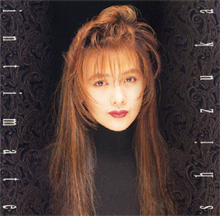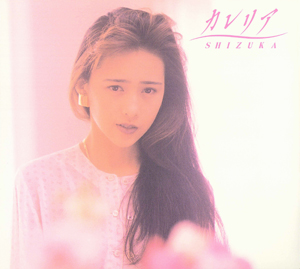
Listen to My Heart is the debut Japanese album by BoA. Released in 2002, it debuted at number one on the Oricon Charts. It also reached #12 on yearly charts in Japan of 2002. It stayed on the Oricon Charts for 91 weeks. This album is the first BoA contributed to through writing and composing.
Oricon Inc., established in 1999, is the holding company at the head of a Japanese corporate group that supplies statistics and information on music and the music industry in Japan and Western music. It started as Original Confidence Inc., which was founded by Sōkō Koike in November 1967 and became known for its music charts. Oricon Inc. was originally set up as a subsidiary of Original Confidence and took over the latter’s Oricon record charts in April 2002.

"Valenti" is BoA's sixth single, released on August 28, 2002. The Korean version of the song was released with her Korean album Miracle.

Rosette is the fifth studio album by Japanese singer Shizuka Kudo. It was released on April 4, 1990, through Pony Canyon. Initially titled Mysterious II, Rosette is Kudo's first album to be entirely arranged by Tsugutoshi Gotō and his band members, credited under the name Draw4. The limited first pressing of the album came in a special box packaging. Rosette was re-released in APO-CD format on December 1, 1993.

Perfect Crime is the second studio album by Japanese recording artist Mai Kuraki. It was released on July 4, 2001, by Giza Studio.
Newtral is the fifth studio album by Ikimono-gakari, released in Japan on February 29, 2012. It has reached number one on the Oricon Weekly charts, and became the group's fourth consecutive number-one album.
Exile The Second, or simply The Second, is a Japanese music group comprising Exile members Kenchi, Keiji, Tetsuya, Nesmith, Shokichi and Akira. Formed in 2012, the group is managed by LDH and is signed to the Avex Group record label Rhythm Zone.

Blackpink is the debut Japanese extended play by South Korean girl group Blackpink, released digitally on August 29, 2017, and physically on August 30 by YGEX and Avex Entertainment.

Countdown is the debut Japanese studio album by South Korean-Chinese boy group Exo. It was released on January 31, 2018 by Avex Trax. The album contains previously released Japanese tracks along with four new songs, including the lead single "Electric Kiss".

Intimate is the fourth compilation album by Japanese singer Shizuka Kudo. It was released on December 11, 1991, through Pony Canyon. The album features all singles released from "Koi Hitoyo" (1988) through "Metamorphose" (1991). The opening track, "Dare mo Shiranai Blue Angel" is a re-worked solo recording of an Ushirogami Hikaretai song by the same name released as a B-side to the single "Hora ne, Haru ga Kita" in 1988. The closing track is a new song entitled "Rashikunai", written specifically for the album by Kudo herself, under the pseudonym Aeri.

Rise Me is the eighth studio album by Japanese singer Shizuka Kudo. It was released on April 1, 1993, through Pony Canyon. Rise Me is Kudo's last album to be produced by Tsugutoshi Gotō. It yielded Kudo's best-selling single, "Dōkoku".

Trinity is the seventh studio album by Japanese singer Shizuka Kudo. It was released on March 18, 1992, through Pony Canyon. Trinity is Kudo's last album to be produced by Tsugutoshi Gotō. It yielded Kudo the single, "Mechakucha ni Naite Shimaitai", which became one of Kudo's signature ballads. The album also includes one of Kudo's longest recorded songs, the album closer "Suterareta Neko Janai Kara", which runs for over seven minutes.

Mind Universe is the sixth studio album by Japanese singer Shizuka Kudo. It was released on March 6, 1991, through Pony Canyon. It features the single "Boya Boya Dekinai". The album was re-released in APO-CD format on December 1, 1993. Mind Universe became Kudo's fourth number-one album and her last record to top the Oricon Albums Chart.

Unlimited is the third compilation album by Japanese singer Shizuka Kudo. It was released on November 14, 1990, through Pony Canyon. The album features all original recordings of the singles released from "Koi Hitoyo" (1988) through "Watashi ni Tsuite" (1990), as well as reworked versions with new vocal takes of Kudo's first batch of singles, from "Kindan no Telepathy" through "Mugon... Iroppoi". The album also includes a new song, entitled "Koi Moyō", co-written by Kudo herself, under the pseudonym Aeri, specifically for the album.

Harvest is the second compilation album by Japanese singer Shizuka Kudo. It was released on December 6, 1989, through Pony Canyon, merely two months after the release of the album Karelia. Harvest features the singles "Koi Hitoyo", "Arashi no Sugao" and "Kōsa ni Fukarete", their B-sides, a few select tracks from Kudo's three studio albums released at the time, Mysterious, Shizuka and Joy, as well as a new song recorded and co-written by Kudo for the album.

Karelia is the fourth studio album by Japanese singer Shizuka Kudo. It was released on October 4, 1989, through Pony Canyon. It is a concept album inspired by the music from Finnish Karelia. The album was entirely recorded in Finland and features the Helsinki Philharmonic Orchestra as well as a choir group from the University of Helsinki. Despite being composed and produced by Tsugutoshi Gotō, Karelia lacks any trace of the signature rock style of Gotō's other compositions. The record features lyrics penned by Taeko Onuki and also includes the first song written by Kudo herself, under the pseudonym Aeri. While in Finland, Kudo created oil paintings inspired by the people and landscapes, which were incorporated into the design of the album's packaging. Karelia was re-issued in APO-CD format on December 1, 1993.

Joy is the third studio album by Japanese singer Shizuka Kudo. It was released on March 15, 1989, through Pony Canyon. It is the first of three albums released by Kudo that year: it was followed by the concept album Karelia in October and the compilation album Harvest in December. A limited first pressing of Joy was released in gold CD format. Kudo has stated that Joy is one of her favorite albums she has recorded. Nanase Aikawa has also listed the album as a major influence behind her decision to pursue a musical career. Joy was re-issued in APO-CD format on December 1, 1993.

La Alteración is the sixteenth studio album by Japanese singer Akina Nakamori and second studio album to be released during 1990's. It was released on 21 July 1995 under the MCA Records label. The album includes lead singles Genshi, Onna wa Taiyou Datta.















